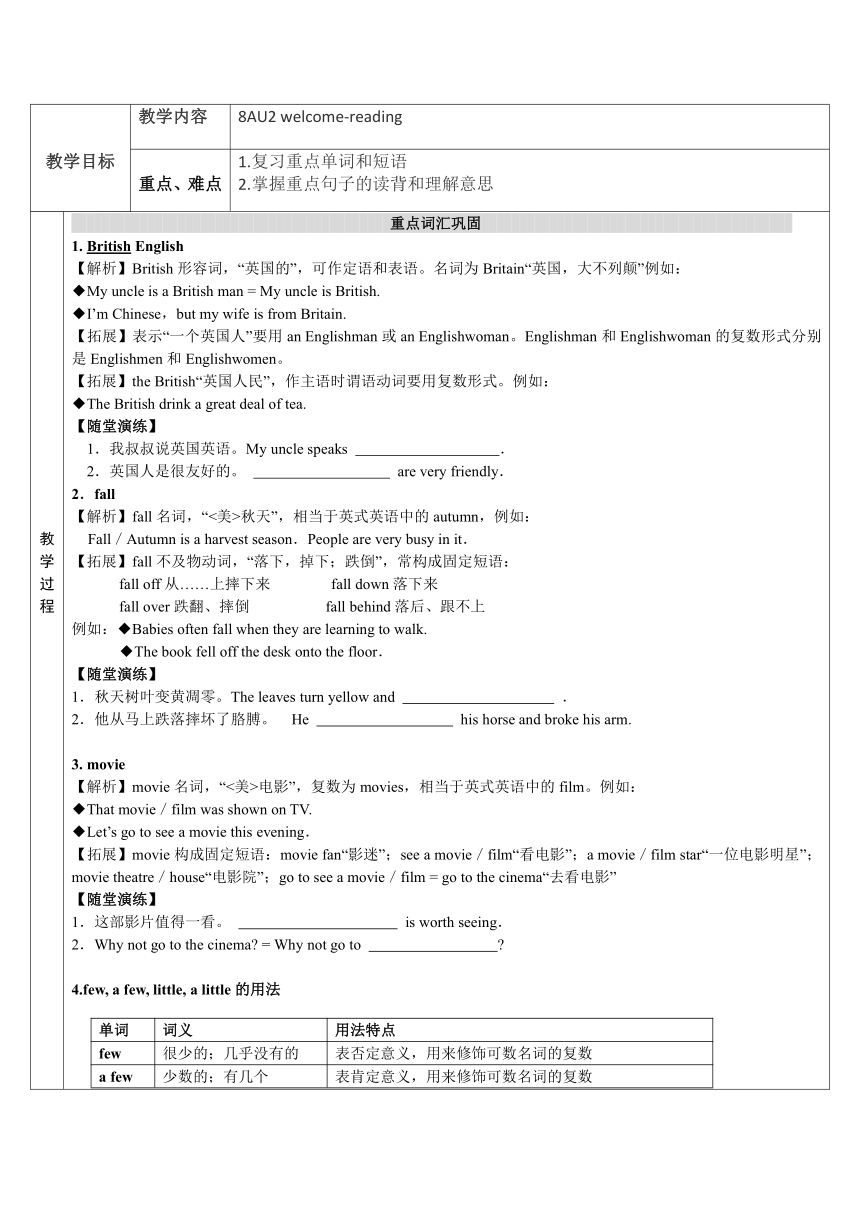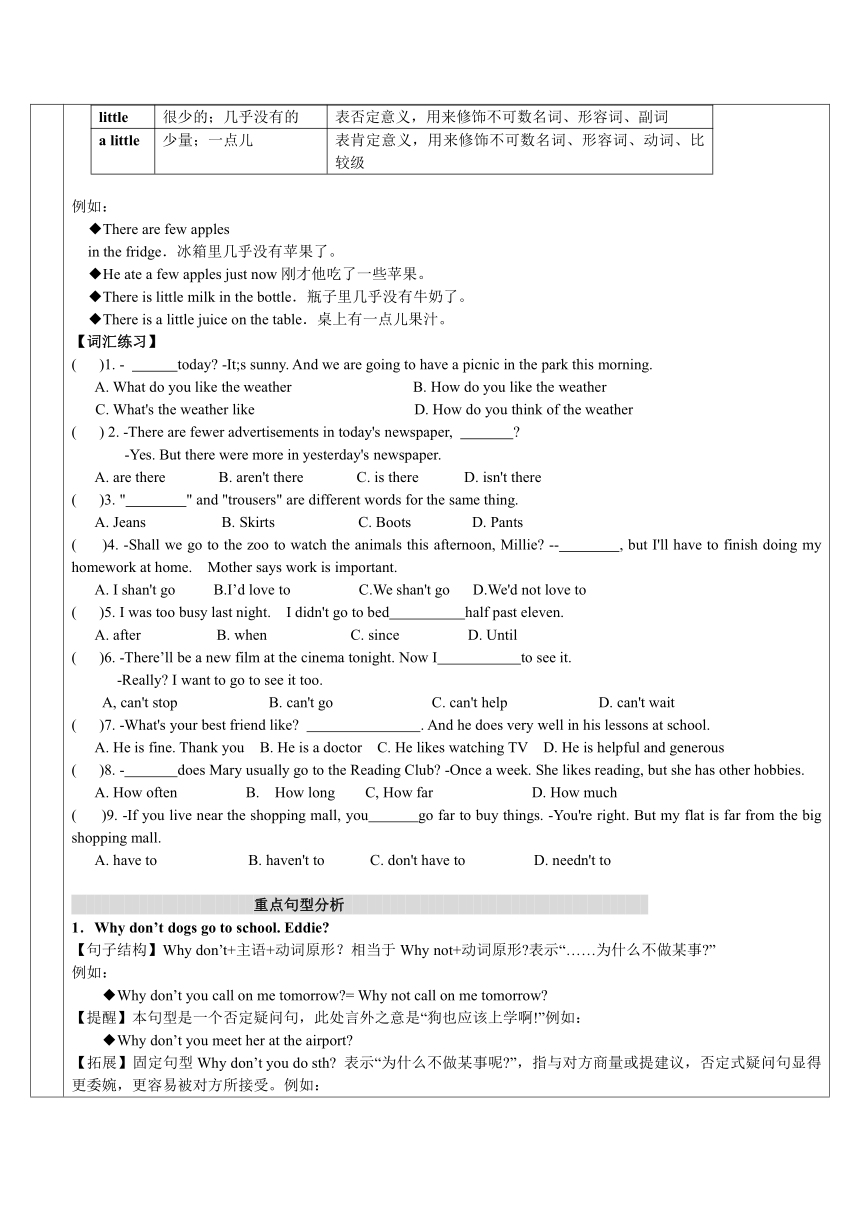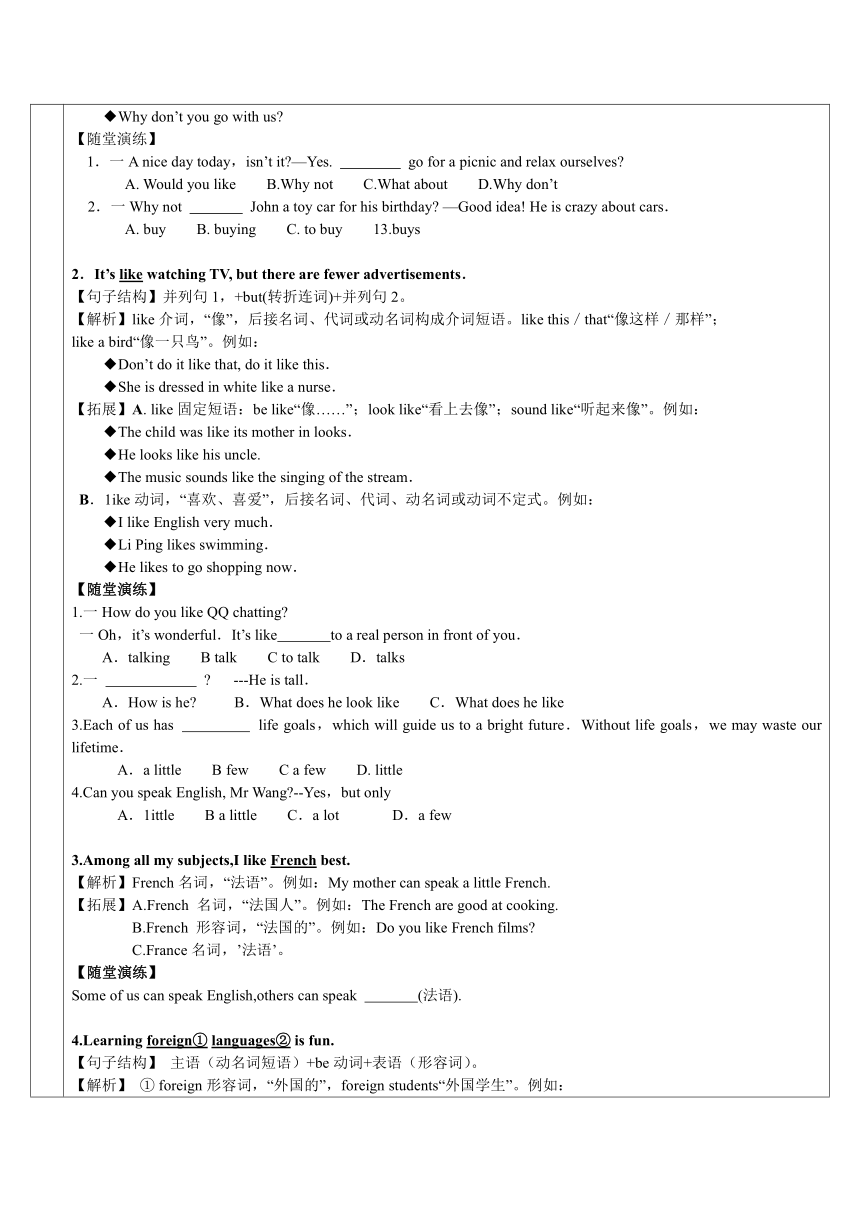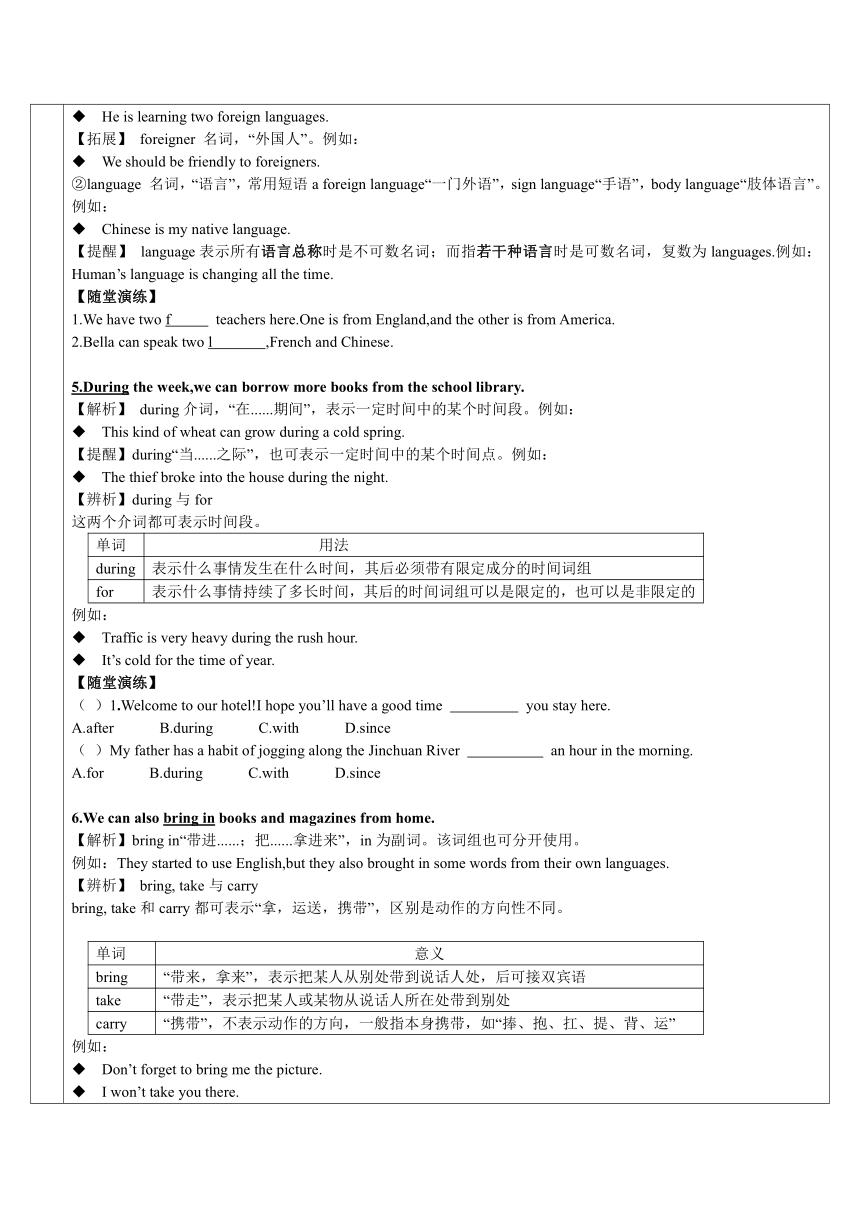Unit 2 School life Welcome-Reading 表格式教案
文档属性
| 名称 | Unit 2 School life Welcome-Reading 表格式教案 |

|
|
| 格式 | docx | ||
| 文件大小 | 29.6KB | ||
| 资源类型 | 教案 | ||
| 版本资源 | 牛津译林版 | ||
| 科目 | 英语 | ||
| 更新时间 | 2023-10-18 00:00:00 | ||
图片预览




文档简介
教学目标 教学内容 8AU2 welcome-reading
重点、难点 复习重点单词和短语 掌握重点句子的读背和理解意思
教学过程 重点词汇巩固 1. British English 【解析】British形容词,“英国的”,可作定语和表语。名词为Britain“英国,大不列颠”例如: ◆My uncle is a British man = My uncle is British. ◆I’m Chinese,but my wife is from Britain. 【拓展】表示“一个英国人”要用an Englishman或an Englishwoman。Englishman和Englishwoman的复数形式分别是Englishmen和Englishwomen。 【拓展】the British“英国人民”,作主语时谓语动词要用复数形式。例如: ◆The British drink a great deal of tea. 【随堂演练】 1.我叔叔说英国英语。My uncle speaks . 2.英国人是很友好的。 are very friendly. 2.fall 【解析】fall名词,“<美>秋天”,相当于英式英语中的autumn,例如: Fall/Autumn is a harvest season.People are very busy in it. 【拓展】fall不及物动词,“落下,掉下;跌倒”,常构成固定短语: fall off从……上摔下来 fall down落下来 fall over跌翻、摔倒 fall behind落后、跟不上 例如:◆Babies often fall when they are learning to walk. ◆The book fell off the desk onto the floor. 【随堂演练】 1.秋天树叶变黄凋零。The leaves turn yellow and . 2.他从马上跌落摔坏了胳膊。 He his horse and broke his arm. 3. movie 【解析】movie名词,“<美>电影”,复数为movies,相当于英式英语中的film。例如: ◆That movie/film was shown on TV. ◆Let’s go to see a movie this evening. 【拓展】movie构成固定短语:movie fan“影迷”;see a movie/film“看电影”;a movie/film star“一位电影明星”;movie theatre/house“电影院”;go to see a movie/film = go to the cinema“去看电影” 【随堂演练】 这部影片值得一看。 is worth seeing. 2.Why not go to the cinema = Why not go to 4.few, a few, little, a little的用法 单词词义用法特点few很少的;几乎没有的表否定意义,用来修饰可数名词的复数a few少数的;有几个表肯定意义,用来修饰可数名词的复数little很少的;几乎没有的表否定意义,用来修饰不可数名词、形容词、副词a little少量;一点儿表肯定意义,用来修饰不可数名词、形容词、动词、比较级
例如: ◆There are few apples in the fridge.冰箱里几乎没有苹果了。 ◆He ate a few apples just now刚才他吃了一些苹果。 ◆There is little milk in the bottle.瓶子里几乎没有牛奶了。 ◆There is a little juice on the table.桌上有一点儿果汁。 【词汇练习】 ( )1. - today -It;s sunny. And we are going to have a picnic in the park this morning. A. What do you like the weather B. How do you like the weather C. What's the weather like D. How do you think of the weather ( ) 2. -There are fewer advertisements in today's newspaper, -Yes. But there were more in yesterday's newspaper. A. are there B. aren't there C. is there D. isn't there ( )3. " " and "trousers" are different words for the same thing. A. Jeans B. Skirts C. Boots D. Pants ( )4. -Shall we go to the zoo to watch the animals this afternoon, Millie -- , but I'll have to finish doing my homework at home. Mother says work is important. A. I shan't go B.I’d love to C.We shan't go D.We'd not love to ( )5. I was too busy last night. I didn't go to bed half past eleven. A. after B. when C. since D. Until ( )6. -There’ll be a new film at the cinema tonight. Now I to see it. -Really I want to go to see it too. A, can't stop B. can't go C. can't help D. can't wait ( )7. -What's your best friend like . And he does very well in his lessons at school. A. He is fine. Thank you B. He is a doctor C. He likes watching TV D. He is helpful and generous ( )8. - does Mary usually go to the Reading Club -Once a week. She likes reading, but she has other hobbies. A. How often B. How long C, How far D. How much ( )9. -If you live near the shopping mall, you go far to buy things. -You're right. But my flat is far from the big shopping mall. A. have to B. haven't to C. don't have to D. needn't to 重点句型分析 1.Why don’t dogs go to school. Eddie 【句子结构】Why don’t+主语+动词原形?相当于Why not+动词原形 表示“……为什么不做某事 ” 例如: ◆Why don’t you call on me tomorrow = Why not call on me tomorrow 【提醒】本句型是一个否定疑问句,此处言外之意是“狗也应该上学啊!”例如: ◆Why don’t you meet her at the airport 【拓展】固定句型Why don’t you do sth 表示“为什么不做某事呢 ”,指与对方商量或提建议,否定式疑问句显得更委婉,更容易被对方所接受。例如: ◆Why don’t you go with us 【随堂演练】 1.一A nice day today,isn’t it —Yes. go for a picnic and relax ourselves A. Would you like B.Why not C.What about D.Why don’t 2.一Why not John a toy car for his birthday —Good idea! He is crazy about cars. A. buy B. buying C. to buy 13.buys 2.It’s like watching TV, but there are fewer advertisements. 【句子结构】并列句1,+but(转折连词)+并列句2。 【解析】like介词,“像”,后接名词、代词或动名词构成介词短语。like this/that“像这样/那样”; like a bird“像一只鸟”。例如: ◆Don’t do it like that, do it like this. ◆She is dressed in white like a nurse. 【拓展】A. like固定短语:be like“像……”;look like“看上去像”;sound like“听起来像”。例如: ◆The child was like its mother in looks. ◆He looks like his uncle. ◆The music sounds like the singing of the stream. B.1ike动词,“喜欢、喜爱”,后接名词、代词、动名词或动词不定式。例如: ◆I like English very much. ◆Li Ping likes swimming. ◆He likes to go shopping now. 【随堂演练】 一How do you like QQ chatting 一Oh,it’s wonderful.It’s like to a real person in front of you. A.talking B talk C to talk D.talks 2.一 ---He is tall. A.How is he B.What does he look like C.What does he like 3.Each of us has life goals,which will guide us to a bright future.Without life goals,we may waste our lifetime. A.a little B few C a few D. little 4.Can you speak English, Mr Wang --Yes,but only A.1ittle B a little C.a lot D.a few Among all my subjects,I like French best. 【解析】French名词,“法语”。例如:My mother can speak a little French. 【拓展】A.French 名词,“法国人”。例如:The French are good at cooking. B.French 形容词,“法国的”。例如:Do you like French films C.France名词,’法语’。 【随堂演练】 Some of us can speak English,others can speak (法语). 4.Learning foreign① languages② is fun. 【句子结构】 主语(动名词短语)+be动词+表语(形容词)。 【解析】 ① foreign形容词,“外国的”,foreign students“外国学生”。例如: He is learning two foreign languages. 【拓展】 foreigner 名词,“外国人”。例如: We should be friendly to foreigners. ②language 名词,“语言”,常用短语a foreign language“一门外语”,sign language“手语”,body language“肢体语言”。例如: Chinese is my native language. 【提醒】 language表示所有语言总称时是不可数名词;而指若干种语言时是可数名词,复数为languages.例如:Human’s language is changing all the time. 【随堂演练】 We have two f teachers here.One is from England,and the other is from America. Bella can speak two l ,French and Chinese. 5.During the week,we can borrow more books from the school library. 【解析】 during介词,“在......期间”,表示一定时间中的某个时间段。例如: This kind of wheat can grow during a cold spring. 【提醒】during“当......之际”,也可表示一定时间中的某个时间点。例如: The thief broke into the house during the night. 【辨析】during与for 这两个介词都可表示时间段。 单词 用法during表示什么事情发生在什么时间,其后必须带有限定成分的时间词组for表示什么事情持续了多长时间,其后的时间词组可以是限定的,也可以是非限定的
例如: Traffic is very heavy during the rush hour. It’s cold for the time of year. 【随堂演练】 ( )1.Welcome to our hotel!I hope you’ll have a good time you stay here. after B.during C.with D.since ( )My father has a habit of jogging along the Jinchuan River an hour in the morning. for B.during C.with D.since 6.We can also bring in books and magazines from home. 【解析】bring in“带进......;把......拿进来”,in为副词。该词组也可分开使用。 例如:They started to use English,but they also brought in some words from their own languages. 【辨析】 bring, take与carry bring, take和carry都可表示“拿,运送,携带”,区别是动作的方向性不同。 单词意义bring“带来,拿来”,表示把某人从别处带到说话人处,后可接双宾语take“带走”,表示把某人或某物从说话人所在处带到别处carry“携带”,不表示动作的方向,一般指本身携带,如“捧、抱、扛、提、背、运”
例如: Don’t forget to bring me the picture. I won’t take you there. He carried the child on his back. 【随堂演练】 If the postman has a registered(挂号) letter for us,he__________it to our flat. brings B.send C.leaves D.take The No.11 bus will__________you there. hold B.bring C.carry D.take ----Let me help you__________the box, Granny. -----Thank you,Li Lei. hold B.bring C.carry D.take 7.Near the end of the week,we discuss the books with our classmates in class. 【解析】 near the end of“将近结束的时候”,end 名词,“结束”。例如: Near the end of this term,I can play the piano very well. 【拓展】end短语总结: in the end 最后,终于 end to end 首尾相接的 to the end 到.....的尽头 by the end of到....结束时为止 at the end of在.....结束时,在......的末端 例如:In the end, I passed the English exam. At the end of the road, there is a small coffee shop. 【随堂演练】 this year, I’ll go to Beijing for job. Near the end of B.In the end C.By the end of D.For the end of You can see the shopping mall_____the street. in the end of B.by the end of C.in the end D.at the end of 8.He often listens carefully to my problems and offers me help. 【解析】 offer 动词,“主动提出,自愿给予”,表示“主动做(某事)”,也可指主动提建议、意见等。固定短语offer sb.sth.= offer sth.to sb.向某人提供某物”。例如: Could you offer me some good suggestions 【拓展】 A.offer 动词,“(卖方)出价”,offer some money for sth.“以多少钱出售某物”,例如: He offered a lot of money for this house. B.offer 名词,“提议,出价”,例如: Thank you for you kind offer of help. 【提醒】 offer 和give 不可同时使用,因都有“提供”的意思,有重复性。 H offered to give her help.[误] He offered her help.[正] 【随堂演练】 1.( )----I’m going to the supermarket,Let me get you some fruit. ----OK.Thanks for your________. offer B.information C.message D.order 他主动给了我几张票。 He some tickets. 9.On Friday afternoon,our school ends earlier than usual. 【解析】 end动词,“结束”,指某一发展过程的最终结束。过去式ended,现在分词ending,例如: School ends at 4:50 every day. 【拓展】end名词,“末端;尽头”,固定结构at the end of “在......末尾”,in the end“最后”。例如: They finished the work at the end of last month. 【随堂演练】 他们唱支歌结束了晚会。 They the party off with a song. 别把故事结尾说出来。 Don’t give away the story. 10.Our team won two games last month. 【解析】 win动词,“赢得;赢‘获胜”,通常指人参赛队、赛马等在竞赛中或战斗中“击败对方”,其中宾语必须是赛事,或比赛项目。过去式为won, 现在分词winning.例如: Which side won the match 【拓展】 win名词“胜利”。例如: They had a big win on the football pools.他们在足球彩票上赢了好多钱。 【提醒】 winner名词,“胜利者,获胜者”。例如: Who’s the winner of the tennis match 【随堂演练】 根据句意及首字母完成单词 She needs to w this point to level the score. 六、词汇。(本题共8小题,每小题1分,共8分) A. 根据句意及汉语提示,写出各单词的正确形式,每空填一词。 63. Millie is planning to learn a second ___________ (语言) during the winter holiday. 64. Most of schools are ________ (混合的) in our country. 65. I am ________ (能够……的) to run 800 metres in three minutes. 66. Mary practiced hard and won in the ________ (网球) match. B. 根据句子意思,用括号中所给词的正确形式填空,每空填一词。 67. The man is very __________ (humour). He is good at telling jokes. Their bedroom is much __________ (tidy) than ours. 69. What is the (quickly) way to remember all the new words in this book 70. We’ll have a (week) English test tomorrow. 七、用括号中所给动词的正确形式填空(本题共6小题,每小题1分,共6分) 71. Keeping pets _____________(be)interesting. 72. Do you have any free time ___________(help)me with the housework 73. I just keep ___________(worry)about the result of my Chinese test. 74. Mrs Lin seems ___________(be)unhappy today. Maybe we didn’t do well in the test. 75. —Why is your English so good —Because I practice _____ (read) English every morning. At weekends, I always spend a little time ______ (listen) to my son’s problems on study. 八、根据所给中文,完成英语句子(本题共6小题,每小题1分,共9分) 77.们阅读有趣的书时,时间似乎过得更快。 Time ______________________ when we are reading interesting books. 78. 国庆节,我将要放假七天。 On National Day, we_________________________. 79. 我们不用早起,而且我们有很多时间参加课外活动。 We ________________________, and we have lots of time for after-school activities. 80. 你每天花多少时间在爱好上? your hobbies every day 81. Sandy 画画比我班其他任何学生都好。 Sandy ________________________________________ in my class. 82. Amy 在跑步比赛中获得了第一名,她跑得最快。 Amy . She ran the fastest. 63—66: language; mixed; able; tennis 67—70: humorours; tidier; weekly 71—76: is; to help; worrying; to be; reading; listening 77. Time seems to go faster when we are reading interesting books. 78. On National Day, we’ll have seven days off. 79. We do not need to get up early, and we have lots of time for after-school activities. 80. How much time do you spend on your hobbies every day 81. Sandy draws better than any other student in my class. 82. Amy came first in the race. She ran the test.
重点、难点 复习重点单词和短语 掌握重点句子的读背和理解意思
教学过程 重点词汇巩固 1. British English 【解析】British形容词,“英国的”,可作定语和表语。名词为Britain“英国,大不列颠”例如: ◆My uncle is a British man = My uncle is British. ◆I’m Chinese,but my wife is from Britain. 【拓展】表示“一个英国人”要用an Englishman或an Englishwoman。Englishman和Englishwoman的复数形式分别是Englishmen和Englishwomen。 【拓展】the British“英国人民”,作主语时谓语动词要用复数形式。例如: ◆The British drink a great deal of tea. 【随堂演练】 1.我叔叔说英国英语。My uncle speaks . 2.英国人是很友好的。 are very friendly. 2.fall 【解析】fall名词,“<美>秋天”,相当于英式英语中的autumn,例如: Fall/Autumn is a harvest season.People are very busy in it. 【拓展】fall不及物动词,“落下,掉下;跌倒”,常构成固定短语: fall off从……上摔下来 fall down落下来 fall over跌翻、摔倒 fall behind落后、跟不上 例如:◆Babies often fall when they are learning to walk. ◆The book fell off the desk onto the floor. 【随堂演练】 1.秋天树叶变黄凋零。The leaves turn yellow and . 2.他从马上跌落摔坏了胳膊。 He his horse and broke his arm. 3. movie 【解析】movie名词,“<美>电影”,复数为movies,相当于英式英语中的film。例如: ◆That movie/film was shown on TV. ◆Let’s go to see a movie this evening. 【拓展】movie构成固定短语:movie fan“影迷”;see a movie/film“看电影”;a movie/film star“一位电影明星”;movie theatre/house“电影院”;go to see a movie/film = go to the cinema“去看电影” 【随堂演练】 这部影片值得一看。 is worth seeing. 2.Why not go to the cinema = Why not go to 4.few, a few, little, a little的用法 单词词义用法特点few很少的;几乎没有的表否定意义,用来修饰可数名词的复数a few少数的;有几个表肯定意义,用来修饰可数名词的复数little很少的;几乎没有的表否定意义,用来修饰不可数名词、形容词、副词a little少量;一点儿表肯定意义,用来修饰不可数名词、形容词、动词、比较级
例如: ◆There are few apples in the fridge.冰箱里几乎没有苹果了。 ◆He ate a few apples just now刚才他吃了一些苹果。 ◆There is little milk in the bottle.瓶子里几乎没有牛奶了。 ◆There is a little juice on the table.桌上有一点儿果汁。 【词汇练习】 ( )1. - today -It;s sunny. And we are going to have a picnic in the park this morning. A. What do you like the weather B. How do you like the weather C. What's the weather like D. How do you think of the weather ( ) 2. -There are fewer advertisements in today's newspaper, -Yes. But there were more in yesterday's newspaper. A. are there B. aren't there C. is there D. isn't there ( )3. " " and "trousers" are different words for the same thing. A. Jeans B. Skirts C. Boots D. Pants ( )4. -Shall we go to the zoo to watch the animals this afternoon, Millie -- , but I'll have to finish doing my homework at home. Mother says work is important. A. I shan't go B.I’d love to C.We shan't go D.We'd not love to ( )5. I was too busy last night. I didn't go to bed half past eleven. A. after B. when C. since D. Until ( )6. -There’ll be a new film at the cinema tonight. Now I to see it. -Really I want to go to see it too. A, can't stop B. can't go C. can't help D. can't wait ( )7. -What's your best friend like . And he does very well in his lessons at school. A. He is fine. Thank you B. He is a doctor C. He likes watching TV D. He is helpful and generous ( )8. - does Mary usually go to the Reading Club -Once a week. She likes reading, but she has other hobbies. A. How often B. How long C, How far D. How much ( )9. -If you live near the shopping mall, you go far to buy things. -You're right. But my flat is far from the big shopping mall. A. have to B. haven't to C. don't have to D. needn't to 重点句型分析 1.Why don’t dogs go to school. Eddie 【句子结构】Why don’t+主语+动词原形?相当于Why not+动词原形 表示“……为什么不做某事 ” 例如: ◆Why don’t you call on me tomorrow = Why not call on me tomorrow 【提醒】本句型是一个否定疑问句,此处言外之意是“狗也应该上学啊!”例如: ◆Why don’t you meet her at the airport 【拓展】固定句型Why don’t you do sth 表示“为什么不做某事呢 ”,指与对方商量或提建议,否定式疑问句显得更委婉,更容易被对方所接受。例如: ◆Why don’t you go with us 【随堂演练】 1.一A nice day today,isn’t it —Yes. go for a picnic and relax ourselves A. Would you like B.Why not C.What about D.Why don’t 2.一Why not John a toy car for his birthday —Good idea! He is crazy about cars. A. buy B. buying C. to buy 13.buys 2.It’s like watching TV, but there are fewer advertisements. 【句子结构】并列句1,+but(转折连词)+并列句2。 【解析】like介词,“像”,后接名词、代词或动名词构成介词短语。like this/that“像这样/那样”; like a bird“像一只鸟”。例如: ◆Don’t do it like that, do it like this. ◆She is dressed in white like a nurse. 【拓展】A. like固定短语:be like“像……”;look like“看上去像”;sound like“听起来像”。例如: ◆The child was like its mother in looks. ◆He looks like his uncle. ◆The music sounds like the singing of the stream. B.1ike动词,“喜欢、喜爱”,后接名词、代词、动名词或动词不定式。例如: ◆I like English very much. ◆Li Ping likes swimming. ◆He likes to go shopping now. 【随堂演练】 一How do you like QQ chatting 一Oh,it’s wonderful.It’s like to a real person in front of you. A.talking B talk C to talk D.talks 2.一 ---He is tall. A.How is he B.What does he look like C.What does he like 3.Each of us has life goals,which will guide us to a bright future.Without life goals,we may waste our lifetime. A.a little B few C a few D. little 4.Can you speak English, Mr Wang --Yes,but only A.1ittle B a little C.a lot D.a few Among all my subjects,I like French best. 【解析】French名词,“法语”。例如:My mother can speak a little French. 【拓展】A.French 名词,“法国人”。例如:The French are good at cooking. B.French 形容词,“法国的”。例如:Do you like French films C.France名词,’法语’。 【随堂演练】 Some of us can speak English,others can speak (法语). 4.Learning foreign① languages② is fun. 【句子结构】 主语(动名词短语)+be动词+表语(形容词)。 【解析】 ① foreign形容词,“外国的”,foreign students“外国学生”。例如: He is learning two foreign languages. 【拓展】 foreigner 名词,“外国人”。例如: We should be friendly to foreigners. ②language 名词,“语言”,常用短语a foreign language“一门外语”,sign language“手语”,body language“肢体语言”。例如: Chinese is my native language. 【提醒】 language表示所有语言总称时是不可数名词;而指若干种语言时是可数名词,复数为languages.例如:Human’s language is changing all the time. 【随堂演练】 We have two f teachers here.One is from England,and the other is from America. Bella can speak two l ,French and Chinese. 5.During the week,we can borrow more books from the school library. 【解析】 during介词,“在......期间”,表示一定时间中的某个时间段。例如: This kind of wheat can grow during a cold spring. 【提醒】during“当......之际”,也可表示一定时间中的某个时间点。例如: The thief broke into the house during the night. 【辨析】during与for 这两个介词都可表示时间段。 单词 用法during表示什么事情发生在什么时间,其后必须带有限定成分的时间词组for表示什么事情持续了多长时间,其后的时间词组可以是限定的,也可以是非限定的
例如: Traffic is very heavy during the rush hour. It’s cold for the time of year. 【随堂演练】 ( )1.Welcome to our hotel!I hope you’ll have a good time you stay here. after B.during C.with D.since ( )My father has a habit of jogging along the Jinchuan River an hour in the morning. for B.during C.with D.since 6.We can also bring in books and magazines from home. 【解析】bring in“带进......;把......拿进来”,in为副词。该词组也可分开使用。 例如:They started to use English,but they also brought in some words from their own languages. 【辨析】 bring, take与carry bring, take和carry都可表示“拿,运送,携带”,区别是动作的方向性不同。 单词意义bring“带来,拿来”,表示把某人从别处带到说话人处,后可接双宾语take“带走”,表示把某人或某物从说话人所在处带到别处carry“携带”,不表示动作的方向,一般指本身携带,如“捧、抱、扛、提、背、运”
例如: Don’t forget to bring me the picture. I won’t take you there. He carried the child on his back. 【随堂演练】 If the postman has a registered(挂号) letter for us,he__________it to our flat. brings B.send C.leaves D.take The No.11 bus will__________you there. hold B.bring C.carry D.take ----Let me help you__________the box, Granny. -----Thank you,Li Lei. hold B.bring C.carry D.take 7.Near the end of the week,we discuss the books with our classmates in class. 【解析】 near the end of“将近结束的时候”,end 名词,“结束”。例如: Near the end of this term,I can play the piano very well. 【拓展】end短语总结: in the end 最后,终于 end to end 首尾相接的 to the end 到.....的尽头 by the end of到....结束时为止 at the end of在.....结束时,在......的末端 例如:In the end, I passed the English exam. At the end of the road, there is a small coffee shop. 【随堂演练】 this year, I’ll go to Beijing for job. Near the end of B.In the end C.By the end of D.For the end of You can see the shopping mall_____the street. in the end of B.by the end of C.in the end D.at the end of 8.He often listens carefully to my problems and offers me help. 【解析】 offer 动词,“主动提出,自愿给予”,表示“主动做(某事)”,也可指主动提建议、意见等。固定短语offer sb.sth.= offer sth.to sb.向某人提供某物”。例如: Could you offer me some good suggestions 【拓展】 A.offer 动词,“(卖方)出价”,offer some money for sth.“以多少钱出售某物”,例如: He offered a lot of money for this house. B.offer 名词,“提议,出价”,例如: Thank you for you kind offer of help. 【提醒】 offer 和give 不可同时使用,因都有“提供”的意思,有重复性。 H offered to give her help.[误] He offered her help.[正] 【随堂演练】 1.( )----I’m going to the supermarket,Let me get you some fruit. ----OK.Thanks for your________. offer B.information C.message D.order 他主动给了我几张票。 He some tickets. 9.On Friday afternoon,our school ends earlier than usual. 【解析】 end动词,“结束”,指某一发展过程的最终结束。过去式ended,现在分词ending,例如: School ends at 4:50 every day. 【拓展】end名词,“末端;尽头”,固定结构at the end of “在......末尾”,in the end“最后”。例如: They finished the work at the end of last month. 【随堂演练】 他们唱支歌结束了晚会。 They the party off with a song. 别把故事结尾说出来。 Don’t give away the story. 10.Our team won two games last month. 【解析】 win动词,“赢得;赢‘获胜”,通常指人参赛队、赛马等在竞赛中或战斗中“击败对方”,其中宾语必须是赛事,或比赛项目。过去式为won, 现在分词winning.例如: Which side won the match 【拓展】 win名词“胜利”。例如: They had a big win on the football pools.他们在足球彩票上赢了好多钱。 【提醒】 winner名词,“胜利者,获胜者”。例如: Who’s the winner of the tennis match 【随堂演练】 根据句意及首字母完成单词 She needs to w this point to level the score. 六、词汇。(本题共8小题,每小题1分,共8分) A. 根据句意及汉语提示,写出各单词的正确形式,每空填一词。 63. Millie is planning to learn a second ___________ (语言) during the winter holiday. 64. Most of schools are ________ (混合的) in our country. 65. I am ________ (能够……的) to run 800 metres in three minutes. 66. Mary practiced hard and won in the ________ (网球) match. B. 根据句子意思,用括号中所给词的正确形式填空,每空填一词。 67. The man is very __________ (humour). He is good at telling jokes. Their bedroom is much __________ (tidy) than ours. 69. What is the (quickly) way to remember all the new words in this book 70. We’ll have a (week) English test tomorrow. 七、用括号中所给动词的正确形式填空(本题共6小题,每小题1分,共6分) 71. Keeping pets _____________(be)interesting. 72. Do you have any free time ___________(help)me with the housework 73. I just keep ___________(worry)about the result of my Chinese test. 74. Mrs Lin seems ___________(be)unhappy today. Maybe we didn’t do well in the test. 75. —Why is your English so good —Because I practice _____ (read) English every morning. At weekends, I always spend a little time ______ (listen) to my son’s problems on study. 八、根据所给中文,完成英语句子(本题共6小题,每小题1分,共9分) 77.们阅读有趣的书时,时间似乎过得更快。 Time ______________________ when we are reading interesting books. 78. 国庆节,我将要放假七天。 On National Day, we_________________________. 79. 我们不用早起,而且我们有很多时间参加课外活动。 We ________________________, and we have lots of time for after-school activities. 80. 你每天花多少时间在爱好上? your hobbies every day 81. Sandy 画画比我班其他任何学生都好。 Sandy ________________________________________ in my class. 82. Amy 在跑步比赛中获得了第一名,她跑得最快。 Amy . She ran the fastest. 63—66: language; mixed; able; tennis 67—70: humorours; tidier; weekly 71—76: is; to help; worrying; to be; reading; listening 77. Time seems to go faster when we are reading interesting books. 78. On National Day, we’ll have seven days off. 79. We do not need to get up early, and we have lots of time for after-school activities. 80. How much time do you spend on your hobbies every day 81. Sandy draws better than any other student in my class. 82. Amy came first in the race. She ran the test.
